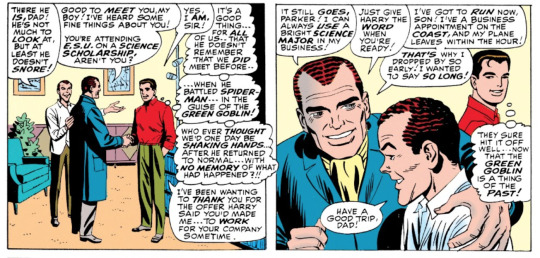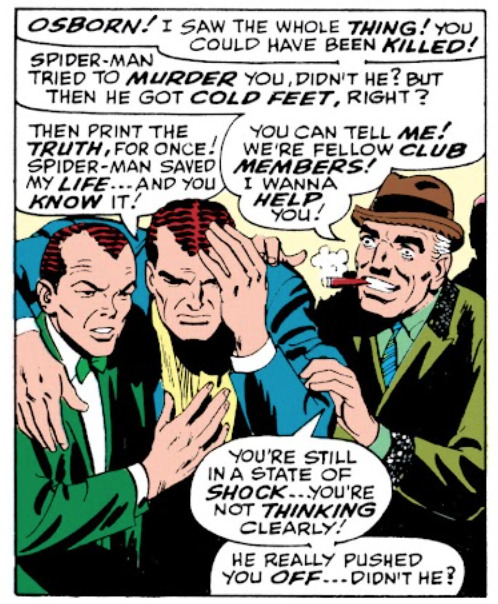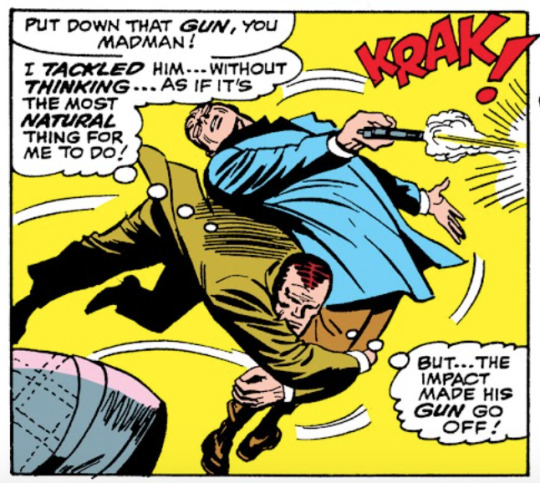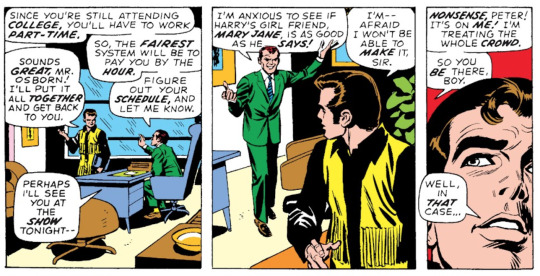Text
@poke-maniac
I am making this post because it was too frustrating replying in the comments section of the original post.
“ I said that money was a mean to make his company more successful as he himself admits, not just for power's sake.”
Yes, but I wonder what making his company more successful would do to the amount of power he wields. Could it be that it would generate MORE power for him??????????????
“Which is more or less confirmed in sinister war, but since you ignore everything that happens after post OMD as if nothing was canon anymore, I guess you don't see it as a valid argument.”
It’s more than just that I discount it for being post-OMD. From what you have described of Sinister War I do not see how this goes against anything I have said. Norman wanted to money to make his company more successful. But in doing this he makes himself more powerful.
The priority is ALWAYS power. In fact, few people who are rich assholes as you put it are in it for the sake of money alone, but predominantly for the POWER that money grants them.
But even if we argue that there those who really are JUST in it for the money, Norman isn’t one of them as he literally told us that in ASM #40:



Oh look, Norman EXPLICTELY saying that he needed to become wealthy because that was the only way he could become POWERFUL!
“We shouldn't apply real life psychology to fictional people,”
This is, simply put, one of the most astronomically bad takes I have ever had the misfortune of reading.
There is so much to unpack with this, but let’s just get down to the basics. If we aren’t going to apply real life psychology to fictional people what the fuck does the term ‘believable character’ even mean. How are they believable if not in terms of who they are, what they think, what they feel, how they act is psychologically realistic. Because that is what psychology boils down to ‘what is happening inside of a human being to make them behave the way they behave’.
Second of all, there is a GIGANTIC overlap between the mental muscles and psychologists and good writers flex for the very obvious reason that both jobs entail getting inside people’s heads. Its just that for writers those people happen to be fictional.
The proof in the pudding of this is Carl Jung, perhaps the second most famous psychologist behind Freud himself, and indeed was at a time viewed by Freud as his heir in the field of psychology. Jung’s works are massive and complicated to explain but one of the things he often brought up was the connection between psychology and mythology/fairy tales/folklore.
“Like Freud, the psychologist Carl Jung also took myths seriously. Jung believed that myths and dreams were expressions of the collective unconscious, in that they express core ideas that are part of the human species as a whole. In other words, myths express wisdom that has been encoded in all humans, perhaps by means of evolution or through some spiritual process. For Jungians, this common origin in the collective unconscious explains why myths from societies at the opposite ends of the earth can be strikingly similar. ”-
This school of thought is eventually what led literature professor Joseph Campbell to study myths from various cultures and write his landmark book ‘The Hero with a Thousand Faces’. Here is a wikipedia excerpt about the book:
“The book includes a discussion of "the hero's journey" by using the Freudian concepts popular in the 1940s and 1950s. Campbell's theory incorporates a mixture of Jungian archetypes, unconscious forces, and Arnold van Gennep's structuring of rites of passage rituals to provide some illumination.[4] ”-
So psychology and storytelling are inherently intertwined and ALWAYS have been.
Third of all, there is no end of examples of critically acclaimed works of fiction that DO apply real life psychology to fictional people. Breaking Bad is one seasons long epic exploring the realistic psychological change of Walter White into a drug kingpin.
The Sopranos stemmed from creator David Chase’s psychological struggles with his mother and the therapy he went through to try and deal with it. Not only was it applying psychological realism to these fictional gangsters (and their families) but it went so far as to have a psychologist as a main character and make her sessions with Tony Soprano integral to the plot/character exploration of Tony himself.
And, just in case you were trying to say ‘fictional comic book people’, Batman’s villains are regarded as the best villains in mainstream comic book history in large part because because of their psychological complexities. There is literally a podcast hosted by a real life psychologist where they review and apply psychological realism to every episode of Batman the Animated Series:
The fact that she was able to do that at all speaks to how clearly the writers WERE applying real life psychology when writing Batman the Animated Series, the most transparent example being ‘Mad Love’, the origin of Harley Quinn. not only was Harley a psychologist herself, but her origin story stemmed directly fro co-creator Paul Dini's experiences with therapy and includes one of your so called 'Freuduan excuses' for why Harley is the way she is:
"Paul Dini: I’m no stranger to therapy. I was spending some time in therapy and was in my head a lot around that time. Bruce and I were discussing her origin one day over lunch, because I had been approached by DC to do a special issue of the comic, and we were talking about what if there was some sort of surprise to her origin? What if she’s not just a hench girl? We came up with the idea that she had been a doctor at Arkham Asylum and the Joker had gotten into her head and worked her into being his follower. … Then we thought, what if Harley’s in the role of the long-suffering girlfriend?
There was also an element of the fans who write to a prisoner who committed a terrible crime and say, “I understand you… I see the good in you,” and sometimes develop a relationship."

Bill Mantlo literally name dropped a psychological term during one of his 1980s Spider-Man stories. They got the term wrong, but the desire to use it at all when it wasn’t necessary ever so slightly hints that comic book writers frequently DO try to apply psychological realism to these fictional people.

Iconic Iron Man writer/prolific Spider-Man writer/co-creator of Venom and Carnage David Michelinie featured a psychologist character in at least two of his Spider-Man stories and used his insights as a way for Spider-Man to defeat both Doc Ock and Venom.

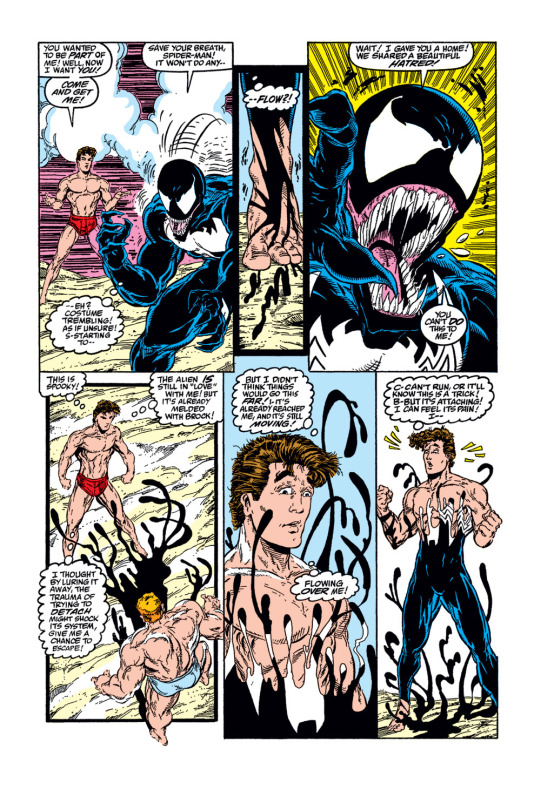
Bruce Banner/the Hulk is a character who hinges upon psychological realism. The entire premise of the character is that he has disassociative identity disorder and that the famous green savage Hulk everyone knows is an expression of his traumatised inner child throwing a gamma fuelled temper tantrum.
Peter David, who has written MANY Spider-Man stories including the iconic ‘Death of Jean DeWolff’, literally wrote an issue that took place inside Bruce Banner’s mind and where his fragmented identity (Bruce banner, Green Hulk, Grey Hulk) is made whole; an issue outright called 'Honey I Shrunk the Hulk' (as in head shrink).
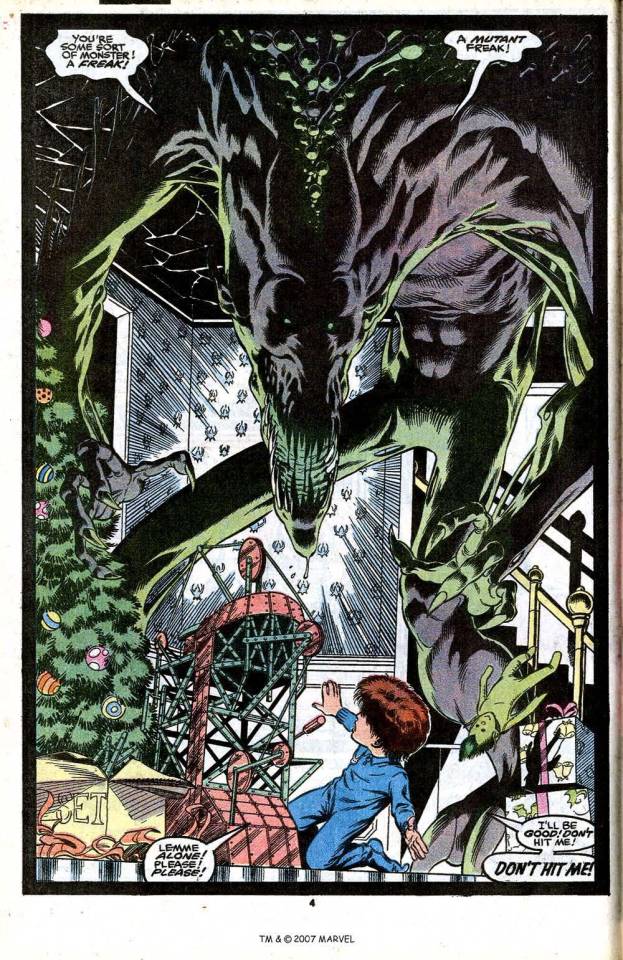
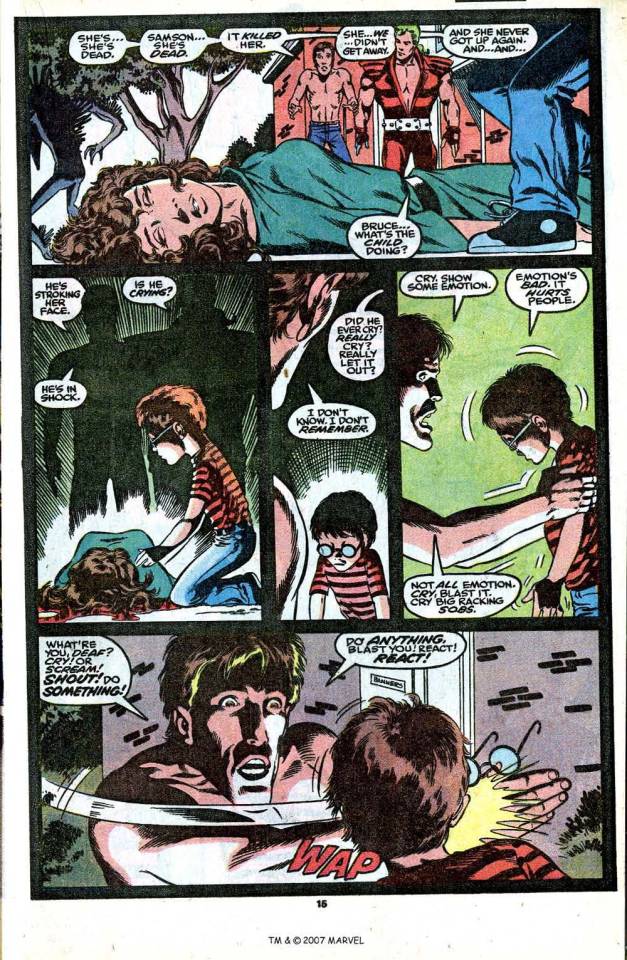

(Oh look, an abusive father who hit Bruce. Guess the Hulk's origin doesn't make sense and is shit now too).
PAD’s Hulk yarn wasn’t the only Marvel story in the 1990s that literally dives into the head of a fictional person (i.e. the most blatant example of trying to apply psychological realism to them). There was also two stories that did exactly that with symbiotic serial killer Carnage:
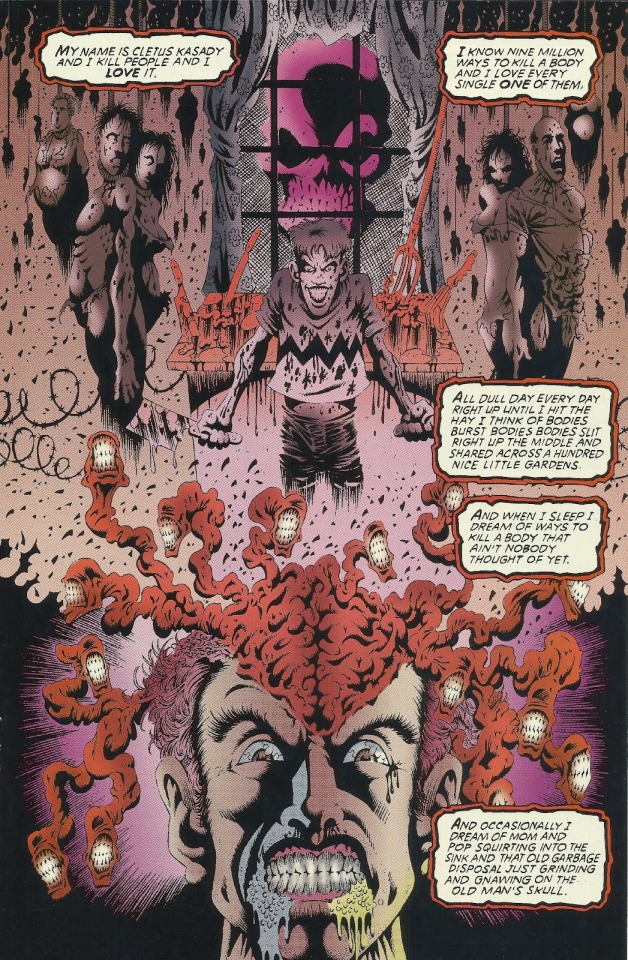
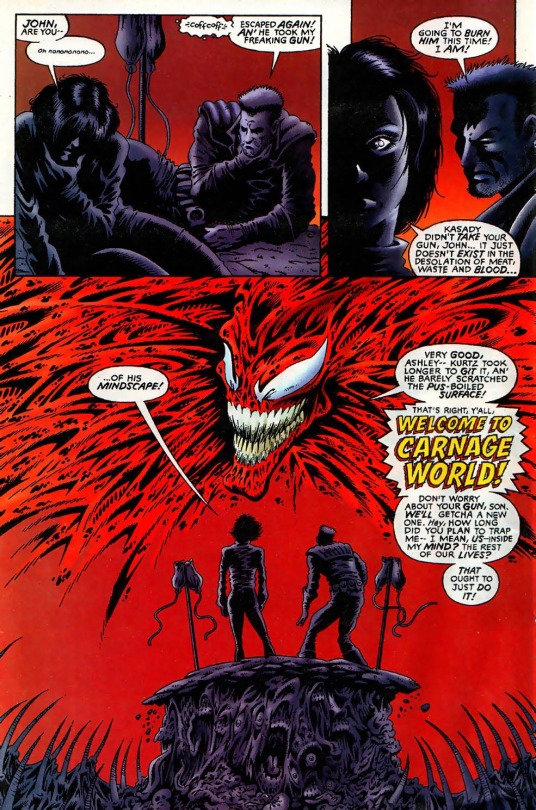
One of those characters was Dr Ashley Kafka, a psychologist supporting character introduced for Spider-Man stories.
Hmmm…why would Spider-Man comics introduce a psychologist as a supporting character? Well, there could be various uses for a character like that but perhaps one of them might be to offer realistic psychological insights into these fictional people. Fictional people like Venom.

Or Vermin.
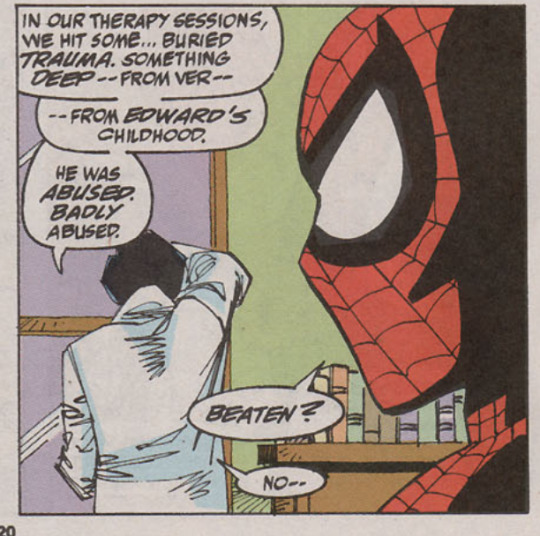

Or the Chameleon.
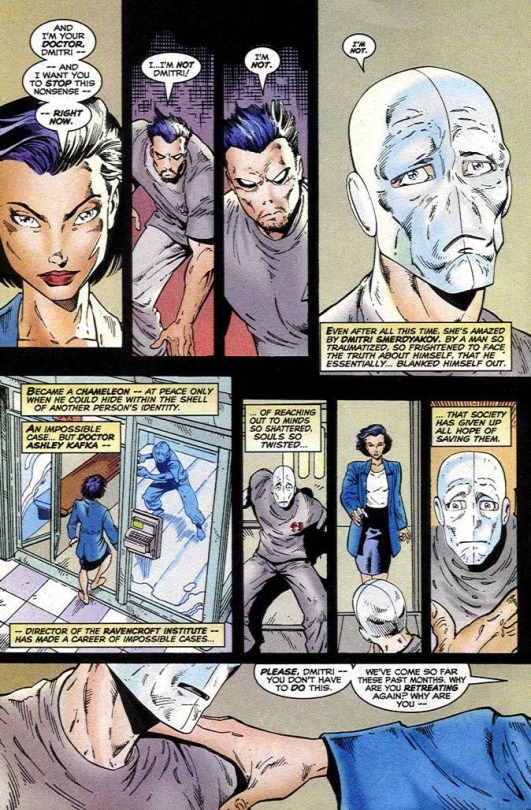
Hey, who created Ashley Kafka anyway?
It was prolific comic book writer J.M. DeMatteis. I wonder why he was so prolific, I mean what sort of stories has he done over at DC?
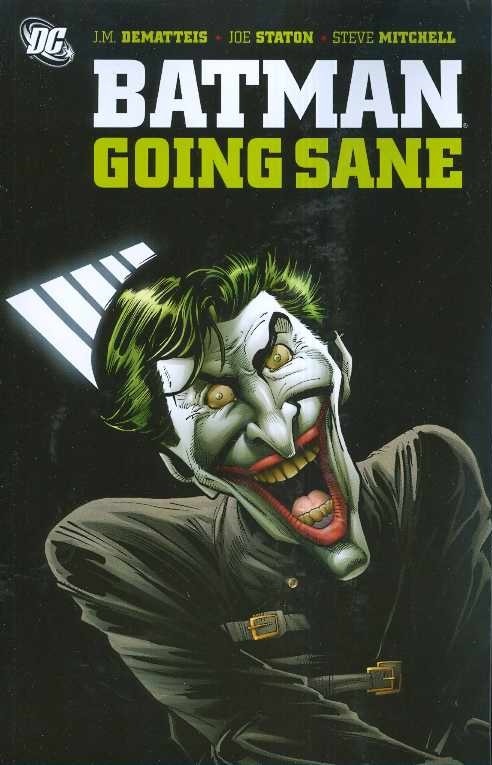
Oh…a story that acts as a psychological exploration of the Joker and his relationship to Batman. Fun fact, this story was originally rejects by DC because it was too similar to the Killing Joke…because it was also a psychological exploration of the Joker and his relationship to Batman.
Over at Marvel though, other than creating Ashley Kafka, what did J.M. DeMatteis write?
Oh, that’s right….
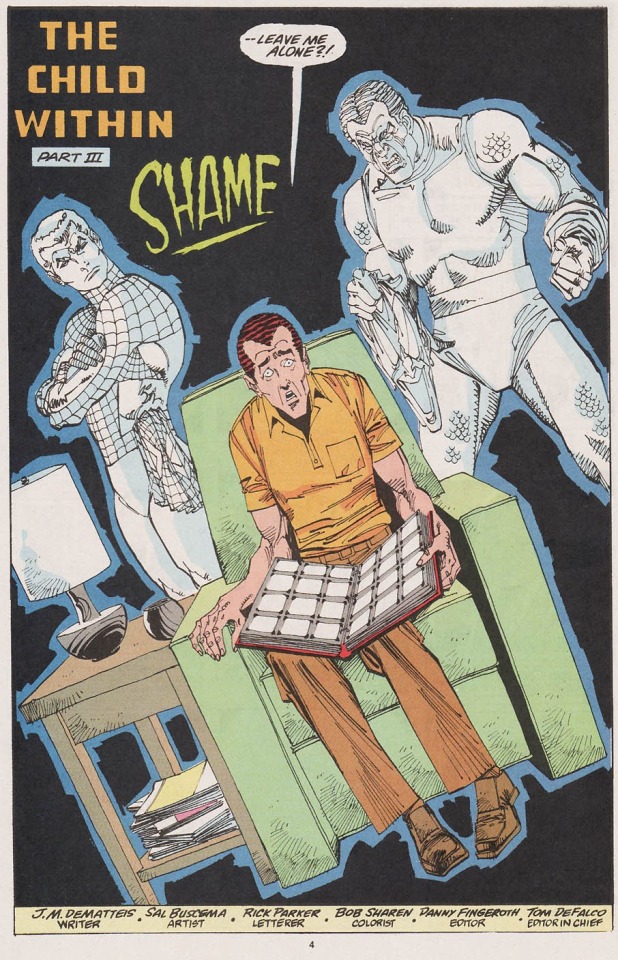
And...

And...
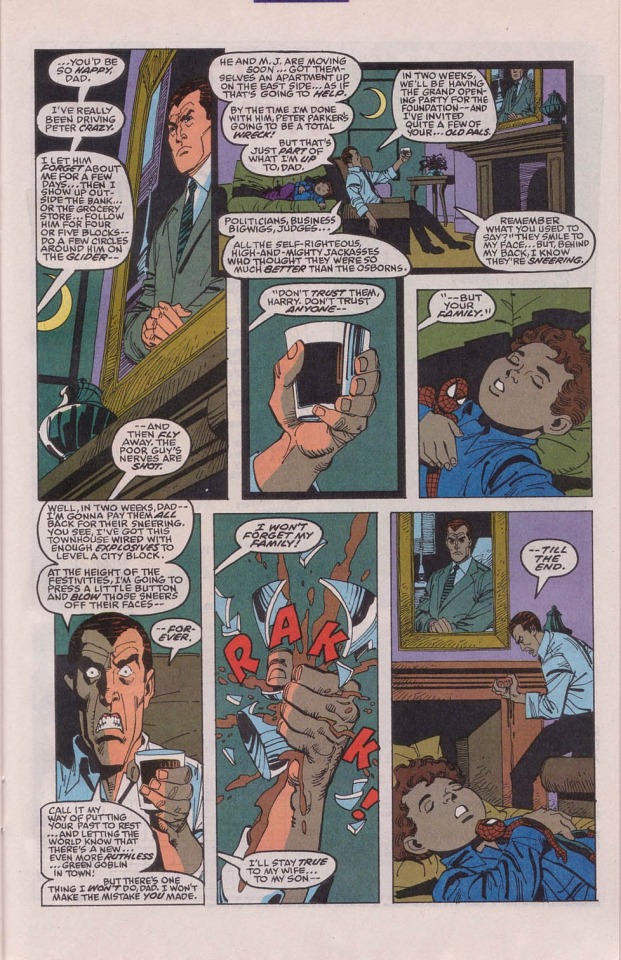
And...

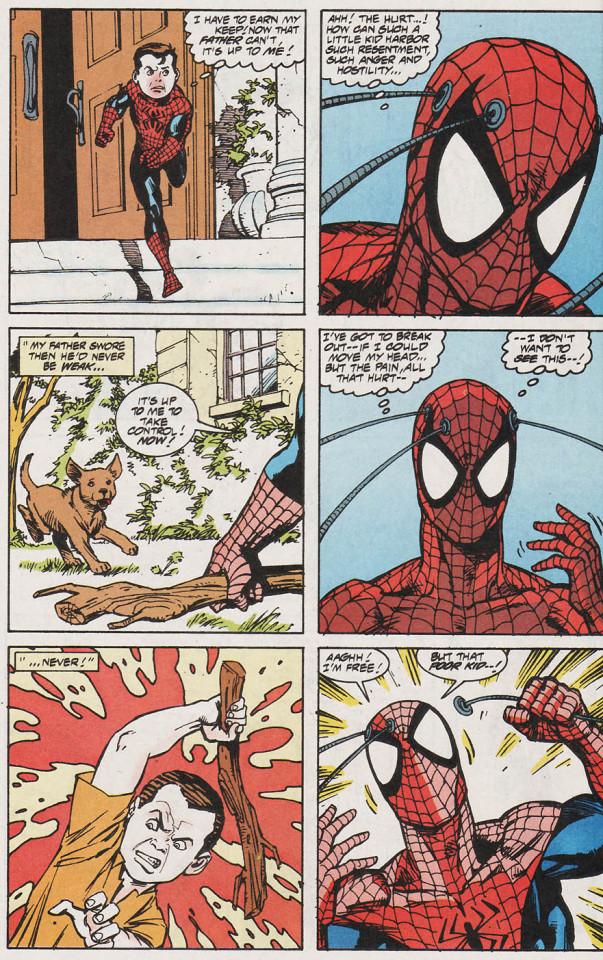

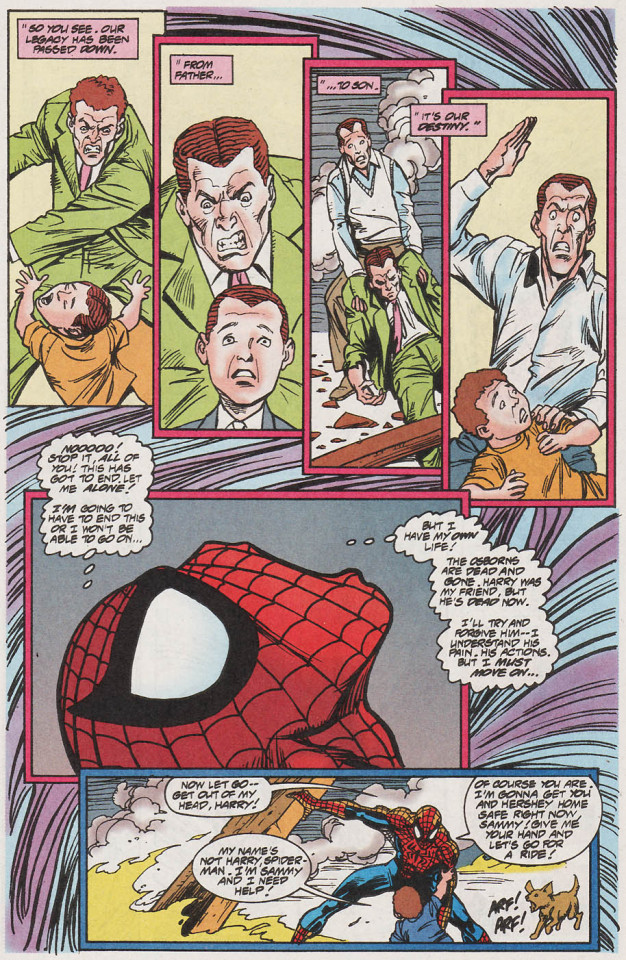
He wrote many of the stories we’ve been talking about this whole time. He was the guy who retconned the origin of Norman and Harry Osborn and explored Norman’s childhood in the first place.
Now it is a sad reality that there isn’t a single direct quote from DeMatteis proving he did in fact try to apply psychological realism when writing fictional people…
"We write about the things that obsess us. The themes in a writer’s work are the themes of a writer’s life. The Big Theme that has always obsessed me is the search for meaning, for personal, and cosmic, identity. Who are we? Why are we here? What’s the meaning of it all? Exploring those ideas, from both a psychological and spiritual perspective, is the driving force behind many of my stories, whether they’re more personal projects like Moonshadow or more popular ones like Spider-Man."
"I enjoy reading books about psychology and spirituality, books that explore the shadowed caverns of our psyches and the luminous castles of our souls."
"All the clever plotting in the world won’t help if it’s not grounded in psychologically real, relatable, characters."
"Peter Parker is one of the most psychologically and emotionally real characters in the history of comics"
"Harry and Peter are both very complex people, which meant that while the superhero action played out there was lots of room for psychological and emotional exploration."
…there are MULTIPLE direct quotes proving exactly that.
So YES we categorically should apply real life psychology to fictional people!
“ especially that nothing suggests in canon that his [Norman Osborn’s] dad was beating him to "feel powe[rful]”
I’ve said before and I will say it again, that is EXACTLY what is suggested by Spec Annual 1994 and Revenge of the Green Goblin.

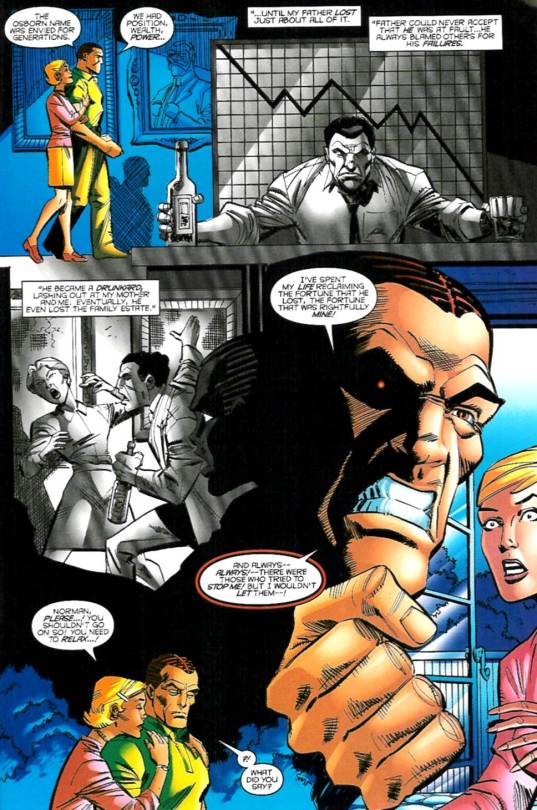
Norman's Dad loses the business and lashes at his son but this had NOTHING to do with him feeling powerless?
What do you think it means when someone feels powerless?
What do you think it means when someone of the old school tries to reaffirm that they are still 'a man'?
It is about power!
“All that's textually said is that he was lashing out on his family, in rage like many people irl when they lose everything.”
Yes but why would someone IRL lash out when they lose everything.
*gasp!*
You don’t possibly think they do that because losing everything makes them feel powerless and bullying someone else in turn makes them feel powerful, do you????????????? Feeling powerful couldn’t possibly be the root cause of why anyone bullies anyone else ever could it????????????????????????????????????????
Its almost like in textually saying he was lashing out because he lost everything it made him feel powerful or something?
Oh and by the way, ever so slightly undermined your own argument there. “We shouldn't apply real life psychology to fictional people,” vs. “…was lashing out on his family, in rage like many people irl when they lose everything.”
Which is it?
(not to mention if we aren’t supposed to apply real life psychology to fictional people why were you doing exactly that with your avatar examples?)
“Yeah the amnesia part never made any sense to begin with. It's said that the formula made him worse yet it doesn't seem to affect "amnesic" Norman all that much. Maybe it does? Because we don't see him all that much during his amnesia periods.”
We see PLENTY of Norman when he has amnesia.
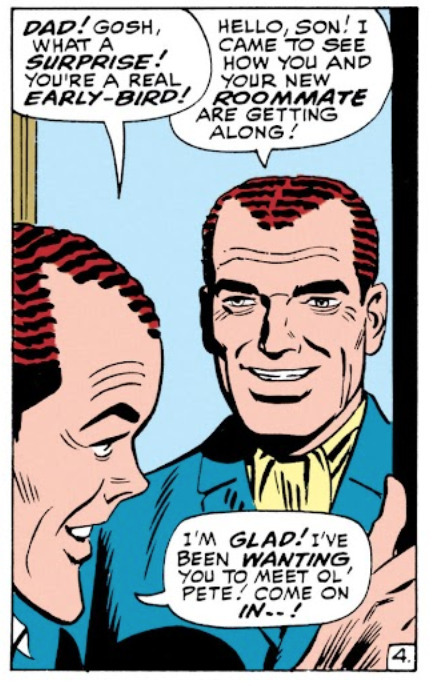

So no the formula does not affect norman when he has amnesia.
But an idea slightly suggested in ASM #40 and then eventually confirmed in Revenge of the Green goblin was that the formula made norman worse because in giving him powers it acted as proof he was superior to everyone else, in other words it sent him on a huge ego trip.

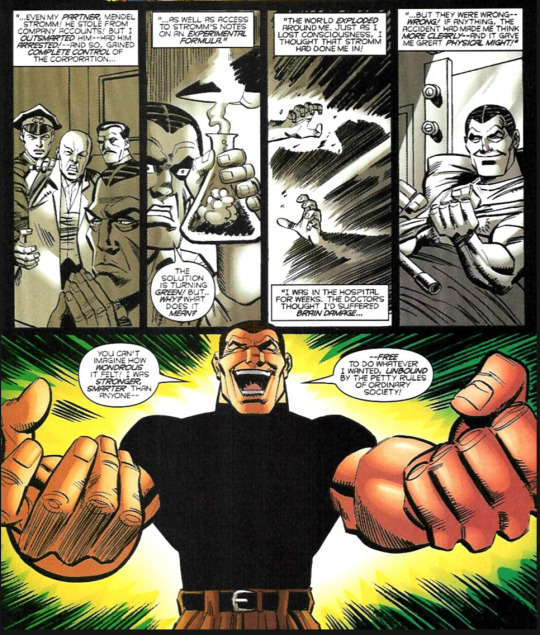
You know what would be interesting? If this Norman Osborn guy who is on a big ego/power trip formed a rivalry with a superhero who began his career on a big ego trip before being humbled. Especially if that hero’s defining philosophy was ‘with great power there must also come great responsibility…
“It honestly looks like a cheap excuse to keep him from telling the truth more than anything”
And as originally written by Stan, it was exactly that. It was taboo for a villain to know the hero’s identity back in the 1960s, or at least for them to go on living with that knowledge. Later stories however addressed this.
“But anyway, it just makes weird that his amnesia would make him a completely different guy if he was the same ashole during this specific time period he remembers (before Harry high school years).”
You haven’t been listening to me at all. You have never once addressed what I have said on this subject.
But I will repeat it again:
WE ARE THE PRODUCT OF OUR MEMORIES! IF YOU CHANGE THE MEMORIES YOU CHANGE THE PERSON!
You want a quick fictional example of this? The Arnie movie Total Recall.
In other words, the ONLY logical explanation for Norman becoming nice is because he DIDN’T just forget his memories after he became the Goblin. He forgot MORE than just that. Which is what happens with real life amnesia. You don’t just forget a set time period.
Yes the narrative has Spider-Man claim it is just everything after the accident that turned him into the Goblin, but how the fuck does Spider-Man know that for sure?
What we have is an objective flashback showing us exactly what Norman was like before the accident, we have objective on the page evidence of what he was like after the accident and we have objective on the page evidence of what he was like post amnesia. Post-accident is basically a bigger jerk of who he was pre-accident. Post-amensia is at odds with both versions.
The ONLY explanation that makes sense is that he didn’t simply forget the last few years, he forgot more than that. he forgot whatever life experiences shaped him into a bad person, or at least he couldn’t remember them clearly. Perhaps he could remember events but not the feelings associated with them.
This syncs up with how IRL amnesia works and reconciles everything, whether you look at the stories in the 1960s on their own or look beyond that decade.
“One could argue that he gradually became more and more neglectful. If Harry is just in denial as he can't see faults in his dad's parenting why did he spot a difference then? If his dad was acting the same as he always did, why would he be only in denial over how his dad acted prior to accident?”
Yeah MAYBE he did become more and more neglectful, but there is nothing on page suggesting that. We just know he WAS neglectful.
But alright, the idea that from Harry’s POV there was a time when things were better but got way worse before the accident, that could fit with the original story.
You know what else could fit just as well? That Harry is in denial. Because he wants/needs to believe at some point he and his Dad had a positive relationship when they actually never did.
Denial doesn’t work on the basis that it is 100% consistent all of the time. Norman was MUCH worse after the accident and Harry was also older and less impressionable and that change occurred within the last few years of his life circa ASM #39. All those factors combined make it entirely possible that he found it harder to deny that his Dad had changed. He’d gone from neglecting him and palming him off to almost entirely isolating himself and become more outspokenly verbally abusive and belittling.
Both were bad situations, but one was much worse.
Oh and be careful, because you almost sound like you are trying to apply real life psychology to counter my points. I thought we weren’t supposed to do that with fictional people?
“Why only complain about his dad's recent outbursts? It's clear that his dad is acting differently towards him. They had some good time together (despite his dad's obssesion over work) before the accident then his behavior towards Harry changed.”
No they didn’t. That’s the point of the story. They DIDN’T have good times together, but by the end of ASM #40 they now hopefully can have good times together.
The ASM #40 flashbacks are the deal breaker on all this. These aren’t simply flashbacks from Norman or Harry’s POV, these are from the omniscient POV as what they are depicting is not in line with what Norman is claiming. And they are not in line with what Harry was claiming in ASm #39 either.
Harry was NOT having a good time ever in those flashbacks and Norman was NOT being a good father.
Thing simply got WORSE after the accident.
Why is it so hard for you to buy into the idea that Harry is in denial?
Your approach is ‘Harry made this claim in a piece of dialogue therefore it MUST be completely true’. Even though the very next issue disproves it. Norman even says ‘I tried to be a pal to Harry’, he uses that exact word ‘pal’. And we see from those flashbacks that, no, he was not being a pal to Harry. He was being a shitty father. He was neglecting him, not talking to him, not engaging him or spending time with him.
So Norman is in denial and that was the point of the scene. BUT Harry, who has his DNA, couldn’t POSSIBLY be in denial also? There simply MUST be these magical phantom scenes we coincidentally never got to see where in fact they were BFFs?
Why is that more believable than ‘both father and son are mentally messed up’.
“Also bad person =/= bad father.”
That lacks nuance. You can be a good parent but in other ways a bad person, that is true.
But if you are a bad parent (specifically abusive, neglectful, putting yourself ahead of your child) you are as a matter of fact a bad person. There is nothing more important than raising a child.
“I'm just arguing about his parenting, not his morality,”
In this situation they are one and the same thing.
The things that make Norman a bad person are in turn what led to him being a bad father. He doesn’t have the ability to be a good father because he is a bad person.
During the Stan run, Norman pre-accident was also a bad parent and a bad person but to a lesser degree. That’s all there is to it. he railroaded his partner. He stole his innovations. He was after money and power. He neglected his son and priotised his pursuit of power ahead of his son’s wellbeing.
That is a BAD person, it just isn’t a total fucking monster which is what the retcons developed him into.
“we don't see much of him during his amnesia period to conclude that he was an all around a good person, just that he was a better dad.”
*pinches bridge of nose*
During his amnesia period (and excluding the period where he was in the process of remembering he was the Goblin) was Norman neglecting his son? No. Was he railroading his business partners? No. Was he stealing their inventions? No.
Oh, he WASN’T doing the things we saw him doing in the pre-flashbacks. But you know what he WAS doing? Being nice to his son. Spending time with his son. Making his son happy.
Hmmmm…its almost as if the things ASM #40 showed us about how pre-accident Norman was a bad person were either absent or directly the opposite with amnesiac Norman.
“But yeah, you're right, this amnesia plot device makes no sense no matter how you look at it but to me it looks like the implications is that his personality was reset before his accident. But to each their own, I guess .”
A story can imply one thing but show another or contradict itself. What is actually happening is more important than implications.
“I agree that Norman abusive background explains why he treats Harry so horribly as it was textually explained, as well as why he's so comfortable with his own darkness, his toxic masculinity but it doesn't explain as well why he became so obsessed with restoring his family's name, wealth, having social power.”
BECAUSE HIS DAD LOST THAT!
Do I actually need to explain that children are heavily influenced by their parents? That they subconsciously look to their parents as role models, that they seek their approval, that how their parents treats them shapes who they grow up to be?
If Norman’s Dad LOST the family’s prestige and was obviously upset about it and that in turn led to him hurting Norman OF COURSE Norman would want to restore it. He would have learned that prestige was important. Thus in restoring on some subcionsious level he’d:
Be making his father proud
Proving himself BETTER than the man who was his physical superior
Avoiding becoming like his father who he saw broken down and rendered weak by losing the company
Making himself powerful and therefore not weak, not like his father who was rendered weak/the helpless weak little boy his father bullied
“It's not about real life psychology, it's all about WRITING.”
THOSE AMOUNT TO THE SAME THING!
You can’t BE a good character writing without applying real life psychology! Because to be a good character writer you NEED to make your characters psychologically convincing, otherwise nobody would buy into them.
See above when I disproved your bullshit about not applying psychology to fiction.
You don’t NEED to have a psychology degree to write good characters but you do NEED to be able to get inside a fictional person’s head and render them as believable. And that would entail making them psychologically realistic.
William Shakespeare never studied psychology. He literally couldn’t have. But he was nevertheless able to write psychologically convincing characters that we CAN successfully apply real life psychology to.
Because writers and psychologists have this gigantic overlap in their respective fields, namely, getting inside people’s heads!
“Writing a proper Freudian excuse that doesn't require ton of meta analysis, real life psychology, conjecture.”
THERE IS NO CONJECTURE! The narrative SPELLS this all out explictely!
“And I'm not denying that it might be one of the factors, but it unlike his abuse of his own son, it's not used explain why he became so fixated on restoring his family's name,”
If Norman’s Dad abused him because the family business was fucked there would obviously be an inherent link between restoring the family business and the abuse he suffered.
This isn’t a Freudian excuse, it is basic bitch literary analysis. High schoolers could grasp this.
Norman didn’t want to be weak as he was when his dad hurt him. Norman didn’t want to be weak as his father was upon losing the business. His dad hurt him because he was upset about losing the business.
Therefore, in hitting Norman, in abusing him, it acted as a powerful motivator later in life to restore the family business.
It. Is. All. There.
“obtaining social power (not just physical) expanding the Osborn legacy”
You need to understand this, not just for the sake of this argument nor for your future reading of fiction, but just plain old navigating through life itself.
Power is power.
If you are made to feel physically powerless you 100% could go on to seek social power.
If a boss makes someone feel powerless at work they could leave work and make themselves feel sexually powerful by having sex with a hooker who they ask to call them ‘boss’ in the bedroom.
If your business is failing and your money is running out so you feel financially powerless and are losing social power there is a strong possibility that you’d hit your own child to feel powerful! Just as Norman’s Dad did.
You keep belligerently REJECTING the idea that there can be a link between social power and physical power but that is the truth of the matter. Not only have I known this for years through, you know, common sense, not only have I read up about this, but just to make 100% certain I am not wrong on this I asked someone I know personally who is a professional psychologist. She confirmed exactly what I’ve been saying.
Norman’s situation is entirely realistic. Which again, is no surprise, since it was written by a DeMatteis who was heavily into psychology and was himself friends with a professional psychologist who he based Ashley Kafka upon.
Oh, but I forgot, we don’t apply IRL psychology to fictional people right? But…if we aren’t doing that…why are YOU insisting that there can be no link between social and physical power??????????????????????????
And furthermore, expanding the Osborn legacy? Yeah, powerful people have wanted to insure they have a legacy to live on after they die since time began. That hasn’t even got anything to do with abuse or psychology. That is just how most animals are wired. We want our offspring to survive us and thrive. For Norman that meant his son and company would be strong
“, why he's a psychopath who loves killing people when we he doesn't get any benefit from it (like this guard's wife) .”
*groans*
He likes killing people because it is an exercise of his power. He is a power addict. He wants more and more power and wants to use it. No one takes power and DOESN’T use it.
Killing people makes him feel powerful.
He wants to feel that way because as a child he was made to feel powerless and saw his dad lose his power.
It is as simple as that.
And you seem to be ASKING for a psychological explanation there? I thought we don’t apply that to fictional people?
Why are you asking why someone is a PSYCHOpath but reject the PSYCHOlogical explanations I’ve been providing for it?
“It doesn't automatically explain IT ALL.”
It literally does. You are just being blind to that reality.
“It's not expanded on.”
There were 3 stories exploring it across nearly 10 years.
That expands upon it pretty well.
“It's not used to explain HOW it shaped his view on power, how it shaped his ruthless and psychopathic, personality (well unless you claim it's unborn ).”
I’m so exhausted at this point. It HAS been used to explain it. It explained it blindingly obviously. I have repeated it multiple times in this post let alone all the other ones I have made during this argument.
I have to ask now if you are trolling or if you are honestly just this blind?
And, again….asking for HOW something shaped someone’s view on power, HOW it shaped their personality? Gosh…that sounds like you are asking for a psychological explanation…but one where we cannot apply real life psychology apparently.
“I just wished that this backstory was more expanded on to show HOW it shaped him”
You literally admitted you haven’t read all the stories I mentioned so how can you possibly complain about all that.
You are complaining that something wasn’t explained when
It was explained IN Revenge of the Green Goblin
RotGG itself was an expansion of Spec Annual 1994, which you said you hadn’t read
“Like, there's so much things going on with him and the authors did the minimum they could,”
They wrote THREE stories exploring Norman and Harry’s childhoods and how those shaped them!
Roger Stern.
J.M. DeMatteis.
Paul Jenkins
Howard Mackie.
FOUR people between 1993-2000 wrote THREE different stories exploring this subject and this is the ‘minimum they could’?
Fucking Hell, what more do you want?
“as if we as readers are automatically supposed to connect all dots just from the knowledge alone that his dad beat him up and that it made him feel weak, so viewed toxic masculinity as "strength" and that it made him accept his own darkness.”
The. Story. Literally. Spells. This. Out!
Go. Read. The. Above. Pages!
But also, I, as a TEN YEAR OLD, understood this from Revenge of the Green Goblin alone. I didn’t even need the Child Within or Spec Annual 1994 to GET it!
It was REALLY obvious.
I’m not saying it should have been subtle…but also it was absolutely NEVER subtle.
To say readers are supposed to automatically connect the dots is saying ‘I have REALLY limited reading comprehension skills and need to be spoon-fed info.’
“Just how are we supposed to expand it to explain his psychopathy, his obsession with restoring his family's legacy which is primary motivation for most of what he does that's not connected to Peter (like the Gathering of five).”
See above. I’ve explained how it is all connected. Better yet read the stories. Though I doubt in this case it will make much difference.
“ This is made even more confusing with Sinister war”
A post-OMD story making things confusing? The shock I have. Its almost as if there was a reason I cut off with 2007
“Not to mention, that most of his much more prevalent roles happen post OMD compared to pre OMD which you entirely reject.”
No they don’t.
His most prevalent roles are his roles as a Spider-Man villain. Most of his appearances as a Spider-Man villain are PRE-OMD to my knowledge.
“Is his backstory still supposed to explain why he acts the way he does post OMD even though you said it made him a different character,”
It is irrelevant to this argument because I was never talking from a post-OMD POV to begin with.
But frankly, if post-OMD Spider-Man was well written (which it isn’t) yes his backstory SHOULD explain whatever he does. Or, more accurately, whatever he does should be written to be consistent with his established backstory in the first place.
The major reason I reject post-OMD is precisely because whether it is Norman, Harry, Venom, Doc Ock, Black Cat, J. Jonah Jameson, Aunt May, Mary Jane or Peter Parker himself, the stories are rarely consistent with their pre-OMD characterisations, whether that’s their backstories or simply older stories they appeared in. Peter doesn’t act like Peter. Mary Jane doesn’t act like Mary Jane. Harry doesn’t act like Harry. And Norman doesn’t act like Norman.
Peter wouldn’t become a paparazzi photographer.
Mary Jane would never break up with him because aunt anna’s life was endangered.
Jameson would never accept Peter upon learning he is Spider-Man.
Black Cat would never want Peter to be her fuck buddy and nothing more.
Doc Ock would never try to rape mary jane.
Harry would never be blasé about not remembering his own son Normie.
Aunt may would never blame peter for abandoning her the night uncle ben died.
These are merely one example for the above characters but you get my point.
If the characters aren’t behaving the way they should be in the context of the situation they functionally are not the characters anymore. And since the characters are the entire point of why we read Spider-Man in the first place, why the fuck should you, me, or anyone factor them into our analysis of those characters? Especially since, last I checked, OMD established that we are literally in a different timeline altogether, one where Peter and MJ never got married, where MJ was never pregnant but somehow, magically, despite this making 0 sense, every 1987-2007 Spider-Man story happened exactly the same way.
“even though it gave another explanation that I won't spoil you (read Sinister war) ?”
In other words Sinister War is bullshit. The new story is obliged to fit with the older one. In other words, if Sinister war has contradicted the origin and the origin doesn’t explain what he does in sinister war, it means sinister war is at fault not the other way around.
Norman in Sinister War SHOULD have been written in sync with his established origin.
“Also Otto was evil even before his ex fiancee died,”
Yes he was, but he WASN’T evil before they broke up. They broke up, he later became Doc Ock and later still she died. I never said otherwise. I said his MOTHER died.
“it only solidified his rivalry with Spider man as he wanted to prove that he's superior foe than Green Goblin.”
Not as originally written he wasn’t. His ex-fiance’s death was originally just AIDs, the idea that Norman infected her with AIDs was a retcon made 20 years later. As originally conceived Norman and Otto had never met face to face before Norman returned in 1996.
But that’s a big tangent that has nothing to do with my point, which was that in one issue it was established that Doc Ock became a villain due to MULTIPLE factors shaping him, not just one thing.
You never addressed my point.
“(Freudian excuse is basically a backstory that's supposed to explain how it shaped a villainous character. Don't know if it's an academic term but It's the term used by tv tropes)”
Then I am complete confusion.
You want an explanation for why Norman is the way he is…but ANY explanation by definition would be a Freudian excuse which is bad????????
But also we cannot use real life psychology?
The only thing I can conclude is you want a reason for Norman being evil that doesn’t involve his Dad hitting him even though in this specific case HOW that shaped him to be evil and twisted his world view is very clearly laid out.
It is just YOU who can’t see it.
But I am not surprised by this if you are also so insistent that we shouldn’t apply real life psychology to fictional characters. Frankly, that alone is a fucking joke of a take
"Norman hating spider man for his amnesia was never expanded on before or after this one throwaway line , that's what I'm saying. His hatred in other comics is never tied to it, directly or indirectly"
That.
Doesn't.
MATTER!
Him saying it ONCE is enough for us to confirm that it IS one of the reasons he hates Spider-Man. And it wasn't even a throwaway line either!
It was him explaining WHY he hates Spider-Man? In a story that was planned to be important, though no one knew HOW important it would go on to become. That is NOT a throwaway line. YOU think it is a throaway line but it is not actually a throwaway line.
You know what line was also only uttered ONCE for over 15 years worth of Spider-Man comic books?
"With Great Power there must also come Great Responsibility"
The most famous line of piece of writing in Spider-Man history, the line that is the defining philosophy of Spider-Man and his universe, was mentioned ONCE at the end of his first appearance in 1962 and was never repeated again until the late 1970s.
So, was THAT just a throwaway line?
Should we discount that as a motivation for Peter Parker?
Why does a line need to be REPEATED or EXPANDED upon to be relevant?
If it was said the once and so long as it doesn't contradict anything else, then it COUNTS. Deal with it.
20 notes
·
View notes
Note
How many love interest Mary Jane watson had other than Spider-Man?
I suppose that depends on your definition of love interest, but let's say anyone whom she shared anything resembling a mutual interest in going on at least 1 date with.
With that in mind off the top of my head we have:
Harry Osborn
Flash Thompson
Alfredo
That character that Michelle dated in FFH, but obvs the comic book version of him
The dude from BND who appeared in Peter Parker Paparazzi and ASM #605
Pedro the Placeholder Boyfriend from Superior
Bruce from ASM Annual #21
This rando character from the Stern run who seemed pretty high society, but I can't recall his name. He appeared in Stern's Daydreamers issue and possibly during the Hobgoblin arc. I say possibly cos I know Mj was on a date with someone during Stern's Hobby arc but I do not remember if that was the same character or not
ARGUABLY her bodyguard from Sensational Spider-Man Annual 2007. She claimed this was a drunken almost-hook-up so depends on how you want to count that one
13 notes
·
View notes
Note
How many persons did mj kissed or had s*x or a intimate relationship
Kiss, I dunno. If we are talking on the lips, off the top of my head there would be:
Peter
Flash
That dude from BND who's name I can't recall
Probably Pedro the Placeholder
Probably Harry
Alfredo
Other than that it is a matter of what did and didn't happen off panel.
In terms of sex the only person she definitely slept with was Peter and beyond that it is up to interpretation, though I'd argue that her post-BND relationships should not be regarded as going to that degree of intimacy simply because it was mega-OOC for MJ to be dating them anyway and we should try to keep the characters as in character as possible.
2 notes
·
View notes
Note
Which clone do you prefer, Ben or Kaine? And why?
I love both but Ben is my fav. partially that is absolutely nostalgia, I knew about him first from the 90s cartoon, had a ben action figure, read some of his stories as a child, etc.
But beyond that I think he is fascinating as a nature vs. nurture exploration of Peter because is more similar to Peter than Kaine. Kaine is interesting that way too, but he's been so tormented by life, it is often hard to see any vestiges of Peter within him.*
Ben then is in effect an in-universe 'What If' version of Peter, a guy who has his exact history and personality up to a point then goes off in a wholly different direction which changes him in some ways, keeps him the same in others, and even retains some elements of who Peter was up to that point that the real Peter grew out of. He is for example a bit more brash than Peter is (see Blood Brothers where he jumps the gun upon seen Molten Man).
I also think he just had a cool status quo and supporting cast of his own when he worked the Daily Grind. It as fascnating again because it was something that felt in line with Peter but was also something Peter had never done. And it allowed for Peter to be a supporting charcter which was interesting to see and allowed the writers to build the Ben/Peter brotherhood that I think does exist between Peter and Kaine but not nearly to the same degree.
Ben's death in PPSM #75 hurt because of that.
*And imo, his 2012-2013 solo series at times handled this badly and opted to just make him kind of a tough guy, almost Logan-esque, rather than envisioning what someone who began (in their minds) as being raised by ben and May might be like in that mould.
11 notes
·
View notes
Note
Responding to your response lol I totally agree with what you said about the ups and downs of that era. Thinking about it again, I think the escape for Peter aspect I mentioned is more prevalent in the Stern run with him dropping out of grad school and beginning his relationship with Black Cat. Imo the Defalco run starts with him still on that kinda downward trajectory with the black suit and such, but that run mainly deals with Peter getting things together plus the major Spider-Man stuff.
I don't think him dropping out of grad school was him escaping though. I think that was actually a very mature responsible decision given the circumstances. Peter wasn't ready to handle the workload AND be Spider-Man AND start this new, extra demanding relationship with Felicia. In addition to regular relationship stuff, he'd be helping her physically heal, pay for her medical bills and also stay on the straight and narrow.*
I don't think him focussing upon that relationship is him escaping because I mean... a relationship isn't an escape from responsibilities unless it is really just fun. But for Peter, Felicia was more than fun, he genuinely deeply cared for her, they were in love. They were disastrously WRONG for one another, and for her part she did not love him for the right reasons, but it was nevertheless sincere.
DeFalco's run is hard to evaluate unto itself because DeFalco and Frenz were having major problems behind the scenes with editor Jim Owsley and EIC Jim Shooter, hence there were lots of fill in issues and their run didn't truly end so much as stop (Spider-Girl being the spiritual successor to that era in many ways).
But again, looking at that general era in context of the other books, I would say it's not exactly peter getting his shit together nor laxing either. He's in effect, as he so often is, being battered around by life. Extenuating circumstances are compounding upon his mental/emotional state in big ways. It's not the death of Gwen stacy, but it's like stuff approaching that level of bad is happening A LOT to him.
This I think is key to why he proposed to MJ. After seeing so much death and loss, and having the fact that Felicia was so WRONG for him (and subconciously realizing MJ was very RIGHT for him) he begins to think about the future, what matters to him, what he really wants.
And what he really wanted was kind of what he has low key had in mind almost since day 1: a family. In many ways, as much as Peter might enjoy being Spider-Man at times, when push comes to shove his vision of an idyllic life is kinda just being... well Uncle Ben actually. A family man; which no surprise is what he becomes in Spider-Girl.
*An objective he'd likely be more committed to due to how he failed the previous time and that ended with him thinking Felicia had died. He's grateful she is alive after that but extra grateful since she almost died multiple times between Spec #75-80 due to Doc ock and surgery.
4 notes
·
View notes
Note
Random question but how do you feel about the 80s era of Spidey?(Roger Stern/ Tom Defalco) I've always interpreted it kinda negatively as Peter getting burnt out, using Spider-Man as an escape from his personal responsibilities and subsequently getting lost in his own escapist fantasy.
I don't exactly agree with that.
So, first of all from the POV of 'how good were the stories', frankly they are in the conversation for the best era of Spider-Man ever. SO many all time classics and a lot of organic character development.
But if we are talking about Peter's POV...I think there is a lot to unpack from your assessment.
For the sake of argument I'm going to broadly (to the best of my recollection) be talking about everything from ASM #224 (basically the start of Stern's regular run) to ASM #288. The latter was not DeFalco's last issue, but it was the end of the Gang War storyline which was a multiparter begun by DeFalco. Also, we have to include other titles and stories alongside ASM to be fair here.
To begin with we could maybe argue Peter mentally/emotionally is in a very different mental/emotional places at the start of Stern's run vs. the end of Stern's run/the start of DeFalco's run vs. the end of DeFalco's run.
Peter began this time period as kinda dating Deb Whitman whilst in grad school, but by the time Stern left/DeFalco took over he'd left grad school and was now dating Felicia, Mary Jane having recently re-entered the picture. By the end of the Gang War arc he and MJ had been through A LOT together, he and Felicia were in a very different place and Peter had frankly endured much darkness, loss and psychological turmoil.
So it's difficult to judge the time period you brought up because there are SO many ups and downs. Even if Peter was using Spidey as an escape at one point in that period, that doesn't mean he was doing it all the time in that period nor even doing that more often than not.
I'd especially argue this during DeFalco's run. Beginning around ASm #275 Peter actively wants to quit being Spider-Man and keeps going primarily due to resolving the Hobgoblin/Flash business. His reasons for quitting are heavily linked with his experiences during the 'Death of Jean DeWolff' arc and his encounters with the Beyonder/Mephisto during Secret Wars II. In ASm #275, MJ has to actively talk him into being Spider-Man.
So, being Spider-Man isn't really as escape of an excuse for him to side step his responsibilities at that point in the timeline. This was an era where Peter's world was growing darker, partially because the book had transitioned into a post-education status quo for Peter so the darkness of the adult life encroached harder upon him, but also because comics in general were growing darker and that was partially in response to a lot of media covered about the rise of street crime, especially in New York city.
Consequently, street level heroes like Daredevil, Batman and Spider-Man and the Punisher found themselves more relevant and more popular than they had been in awhile. But they were also growing more psychologically complex in tandem with that. Under these conditions you can see why Peter would feel more burnt out. Like many people back then (probably especially in big cities like NYC, where the majority of Marvel's staff worked at the time) the world was getting worse and traditional heroic ideals were seeming harder to justify, and more outdated. Rather than respond by making Spider-Man more violent and cynical himself,* they had all that darkness and violence get under Peter's skin, so he became more emotionally vulnerable at that point in time. One of the best examples of this is in Spider-Man vs. Wolverine. Peter is not fighting some larger than life threat in that story nor is he in a fantastical supervillain underwater base or something. He's in Berlin, at the height of the 80s Cold War, seeing real life people gunned down or cut up in a conflict where there are no clear cut heroes at all. His 'ally' in the story is Wolverine and he wants to stab a woman to death as a mercy killing. That same woman then knowingly tricks Spider-Man into killing her, making him an unwilling instrument of her suicide.
Under these conditions, you can see why Peter would be emotionally and mentally burnt out and NEED an escape. These are not things people in real life should be subjected to and real life people who are struggle enormously to cope with them. Peter is dealing with them as much if not more than most real life people and has little outlet to help him, his emotional support network being Mary Jane, Felicia (who is manipulating him) and Aunt May who he cannot be totally open with in the first place. Compounding matters, some of the people Peter has seem die are people he knew and cared about. And some of those people have been doing morally questionable things that makes him question what he knew about them. Betty and Flash are having an affair, Ned Leeds is at times bullying Betty, Mary Jane has been deceiving him for years (justifiably and he forgives her), Black Cat lied about getting powers from Kingpin, Flash Thompson physically assaulted his girlfriend Sha Shan and might be the Hobgoblin.
This stuff was really great drama to read about, but you can sympathise how this would all be a GIGANTIC toll upon Peter's soul, so realistically speaking it isn't all that fair to expect him to be observant of all his major responsibilities.
Having said that, the only responsibilities that I can remember (my memory isn't what it used to be sadly) where he could be said to have been neglectful are maybe dropping out of Grad school. But to be honest, I actually think that was a very wise decision. He just about scraped by before, his life was not in a stable place (even for him) and he had just then adopted the new responsibilty of a relationship with Felicia. Felicia was not only injured (and needed money for her medical bills) but she was also a reforming criminal. Peter wanted to help her physically heal, turn her life around AND build a future with her too, so dropping out of school with a plan to pick it back up eventually is actually very reasonable.
*Outside of the Death of Jean DeWolff where they explored how that was so NOT who Spider-Man was, Daredevil (perhaps the poster child for the new grim and gritty style of heroes at the time) outright acting as Peter's conscience in the story.
10 notes
·
View notes
Note
How do you feel about John Jameson aka man wolf and how he deals with lycanthrophy and the dynamics with his friends, family and loved ones?
I'm neutral on it as I haven't looked into it all that much
3 notes
·
View notes
Text
To the anon who appreciated my post about gwen stacy and shared their email with me.
I thank you for the kind words and friendliness you showed. However, i do not feel comfortable sharing my e-mail.
However, feel free to send me a DM or Ask here on tumblr
3 notes
·
View notes
Note
I just went through all you're superior Spider-Man post and like.. You are right. And its upsetting because when I first picked up the comics I went in like 'wow this is a big twist. Let's see what happens' and on paper they could have done something with this but... Didn't. Like. They dropped the ball hard and the Otto character had been butchered and its upsetting because Otto was my favorite villain since I was small. They could have really done something and didn't. They could have really hammered in that being peter is not easy at all. I would have loved if that was a big theme of wow. Peters life is actually really hard. I would have loved to see Anti Hero Otto in some way. Its all a dumpster fire honestly. I wanted to like the series but as i got further in I just.. Didn't. At all. I was left with a bad taste in my mouth. They could have explored how complicated MJ and peters relationship Is. They had a outsider perspective that could really do something before bringing peter back. Espeically with a villain who isn't completely evil or such. Who is sometimes mirrored to Peter or mentors him in other media. But nope. They thrash MJ for long periods of time, they make Otto unrecognizable, so on. Im screaming internally. Is there any good Spider-Man stories you would recommend?
Yes to all the above!
Recs:
Master Planner Trilogy
Kraven's Last Hunt
Nothing Can Stop the Juggernaut
The Kid Who Collects Spider-Man
Death of Gwen Stacy
Death of Jean DeWeolff
Coming Home
Revenge of the Green Goblin
Marvel Knights: Spider-Man #1-12
5 notes
·
View notes
Note
Oh, was that a threat? Easy to say behind a keyboard but you probably can't fight for shit if it mattered since I could probably deck you with a bat or shoot you with gun but at least I can physically do something.
But what can you expect from someone who talks about a character like they own it when they don't. I bet you dream about killing Tom Holland and any actor or writer associated with the MCU because they 'butchered' and 'raped' something you don't own.....fan entitlement at it's finest since that shit is everywhere......
a) You are yourself saying this from behind a keyboard dumbass
b) You are in fact being even more cowardly because you are doing it anonymously
c) You do not know what I can and can't do
d) I never said I do own the character nor have I ever talked as though I do. YOU have interpreted my words that way because you are so inept at analysis (see above as more proof)
e) If you make a bet like that you will be out of pocket. I have said repatedly stated Holland could be the best Spider-Man. And I do not wish to harm, nor wish harm upon, anyone because they wrote something shitty, even when I think they are themselves a shitty human being. E.g. I think Dan Slott is a bad writer and person but I don't wish harm upon him you fucking weirdo
f) Go fuck yourself you pathetic pretense of a human being
3 notes
·
View notes
Note
What is your preferred Electro design: the mask, lightning bolt scars on his face, or pure electric energy being?
Classic ditto with mask
1 note
·
View note
Note
Careful, guys like that usually live nearby so watch your back because they might try something crazy and well.....you might get swatted or worse.
Those bastards better watch their backs.
1 note
·
View note
Note
Not an MCU stan.....I just love fucking with you guys! It's fun cause you comic purists are all reactionary morons who go off at the slightest attack on their precious toy or cry when something changes....
It's fun watching you just lash out in hate when someone doesn't agree with you and bully them into suicide. I'm not a white knight, I'm just attacking you guys cause no one likes you douchebags and you give the rest a bad rep anyway.......
Besides, what are you gonna do, track me down and kill me? Try it, I dare you
Countless fans were appreciate of the changes made ot Venom and Gwen Stacy in pre-MCU movies. Not all changes are equal. It isn't a matter of purity it is a matter of logic. If Spider-Man is not Spider-Man what point is there in making the movie instead of something original.
This isn't a matter of hate, it is a matter of our opinions and telling the truth given that Marvel spins the narrative that MCU Spidey is true to the comics when he objectively is not.
As for your suicide claims, give me ONE instance where someone who disliked an MCu film changing something from the comics resulted in bullying someone into suicide. I will wait.
And, I'll let you in on a little secret, we don't care that people don't like us. Another secret? nobody likes people like you either. In fact, whilst 'not liking us' implies a passive witholding of positivity, in the cases of 'people' like you it's more a case of active directed negativity. I.e. it is not simply that nobody likes you but rather that they actively DISlike you.
BTW... A human being who hides behind an anonymous feature to troll people and derives pleasure from it is indeed a worthless human being.
Not only do you lack a spine or balls, but the content of your character is vacuous. You are a sad pathetic individual who either is or shall someday have to face the mirror and realise how degenerate and pathetic you are.
That's not bullying. it is simply a statement of fact.
Even if I was inclined to kill you, I wouldn't. Because living your empty and pathetic life day by day is punishment enough.
4 notes
·
View notes
Note
At least we'll get to know Ben before he dies so we actually give a shit.....guess you never thought that the origin story being told over and over ad infinity can get tiring...
Oh but I forgot, you're some shithead with his nostalgia goggles fused to his brain so expecting you to accept changes would be akin to trying to make world peace an actual thing. It's probably why no one can get creative with properties like this anymore...
People like should just be drawn and quartered cause there's no pleasing you assholes.
Bro, we did get to know Ben before he died in Spider-Man 2002 and, though not as well, in ASM 2012.
You are making the ignorant mistake of presuming that because I want Uncle Ben to be acknowledged in the MCU that = do the origin again.
It doesn't.
Uncle ben was a presence in Spider-Man the Animated Series, Spectacular Spider-man the Animated Series and the PS4 video game even though the latter didn't do the origin and the first two didn't start with the origin. STAS didn't give us the origin until season 3 and Spec Spidey until episode 12 but Uncle Ben's presence was still felt and acknowledged and clearly fucking informed Peter's character, underpinning his motivations as a hero.
The MCU has not done that. At all. They had Tony supplant Ben's role as a father figure to the point where the first time Ben is ever referenced is in a fucking What If episode!
Also... 'guess you never thought that the origin story being told over and over ad infinity can get tiring...'
Don't motherfucking PRESUME anything about me son, especially on Spider-Man. I KNOW I have FORGOTTEN more about Spider-Man than you have, or will, ever know. As if I haven't had this conversation like 4 dozen times since 2016, if not earlier.
I'm not a shithead with nostalgia goggles (nor a COWARD who insults people behind the baby blanket of the anonymous ask function). I'm someone who actually knows and understands the fundamental themes and substance of this 60 year old character whilst here you are saying something so profoundly ignorant I know you can only be holding the movie versions alone in that teeny weeny head of yours.
That's funny because the PS4 game, which came out after the MCU version had delivered THREE movies with their version of Peter Parker, absolutely categorically pleased me.
Meanwhile cowardly, spineless worms like you aren't worth drawing and quartering. Why would I want to spread out that much shit and I doubt I know, since you are speaking to me anonymously, that you absolutely have no balls...
9 notes
·
View notes
Note
Hey, did you hear that Spider-Man Freshman Year is a prequel set in the MCU which means we can actually give a shit about Uncle Ben before he dies since his only function was "father figure character who dies to set up the hero's story" in both the Raimi and Marc Webb films....
Which meant that he was the doomed character that the film made obvious that he won't be around the whole movie so you should care cause the main character does which made it hollow since Ultimate Marvel built out Ben and the MCU takes a lot of cues from Ultimate Peter Parker in that regard...
It is supremely pathetic that we get the origin story in a comic book and not on film in anyway
4 notes
·
View notes
Note
What do you think about Peter's age?
I think he would be around 30.
Last i checked when we do the math he'd be like 35-36, and 30 circa OMD in 2007
5 notes
·
View notes

